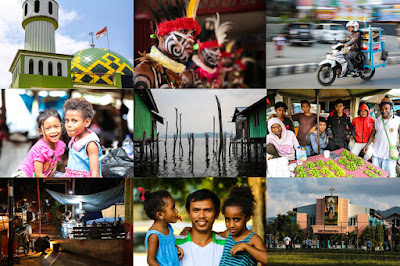2) Indonesian provincial government says Freeport loses $188 million tax appeal
——————————————————
1) West Papuans not yet a minority in homeland
New statistics on the ethnic composition of Indonesia’s Papua region indicate that the indigenous West Papuans are not yet the minority there.
39 minutes ago
Photo: RNZ / Koroi Hawkins
This is despite research following the 2010 national census which extrapolated that Papuans made up around 48 percent of the entire population as the growth of the non-Papuan population soared.
The Indonesian Statistics Office has recently produced an ethnic breakdown of the 40 regencies which make up the provinces of Papua and West Papua, based on the 2010 census.
The stats show that of Papua region's total population of 3.6 million, around 66 percent is made up of Papuans.
But the percentage of Papuans as a proportion of the population has fallen catastrophically in some regions, particularly around urban centres.
The convenor of the West Papua project at the Department of Peace and Conflict Studies at Sydney University, Jim Elmslie, said this pattern hadn't really happened in the Highlands where Papuans still make up the vast majority.
"Even though there's huge developments all across the country that will threaten them, and bring in more settlers and bring in development. And all of those things are drivers of conflict, both between the state - in the form of the police and the military - and Papuan nationalists; and also within areas where there are populations (of Papuans and non-Papuans) who are in effect competing for land."
Dr Elmslie said he it could considered a positive for the indigenous Melanesians that in the Highlands espeically, they are "not on the verge of disappearing under the weight of inward migration".
"Some people seem to feel that the general conflict in West Papua would disappear over time as the Papuan population became a minority. Well that's obviously not gonig to happen. That is happening in the lowlands, but it's not going to happen anytime soon in the Highlands."
The regencies where the non-Papuan population is concentrated tend to be the centres of power and the richest areas where acess to health and education services is best.
Furthermore, the population growth rate of non-Papuans in Papua region is significantly higher than that of Papuans, and based on this trend, the minoritisation of the Papuan population will continue.
Dr Elmslie's new paper confirms that the proportion of Papuan people as a percentage of the entire population continues to decline, which his previous research since 2006 already found.
————————————————————————————-
Wed Jan 25, 2017 | 10:03am EST
2) Indonesian provincial government says Freeport loses $188 million tax appeal
Indonesia's Papua province, home of the giant Grasberg copper mine operated by the local unit of Freeport McMoRan Inc (FCX.N), said it has won a court battle in a claim against the company for 2.51 trillion rupiah ($188 million) in outstanding surface water taxes.
According to Papua's local government Indonesia's Tax Court has rejected a lawsuit lodged by PT Freeport Indonesia over the claim for taxes on water the company used from the Aghawagon and Otomona rivers between 2011 and mid-2015.
Freeport, which used the water to suspend its tailings in the Ajkwa River, about 120 kilometers (75 miles) away, had argued that a substantially lower tax rate should be applied, as set out in its contract of work signed in 1991, the administration said.
"The Papua governor's decree on the refusal of Freeport Indonesia's objections and a letter on tax assessment for surface water tax were declared valid and enforceable," it said, referring to a verdict from Indonesia's Tax Court on January 18. [bit.ly/2kslGaU]
"This ruling was welcomed by the Papuan government's team of attorneys after a long struggle," it said.
A spokesman for Freeport Indonesia declined to comment on the matter.
Freeport Indonesia is currently in talks with the Indonesian government about changing the terms of its mining rights, under which Indonesia expects it to pay more taxes than under its existing contract.
Freeport is one of Indonesia's biggest taxpayers, with direct contributions of more than $16 billion to Southeast Asia's biggest economy in taxes, royalties, dividends and other payments between 1992 and 2015 according to company data.
Indonesia’s Tax Court could not be reached for comment.
(Reporting by Fergus Jensen and Gayatri Suroyo; Editing by Greg Mahlich)
------------------------------

No comments:
Post a Comment
Note: Only a member of this blog may post a comment.